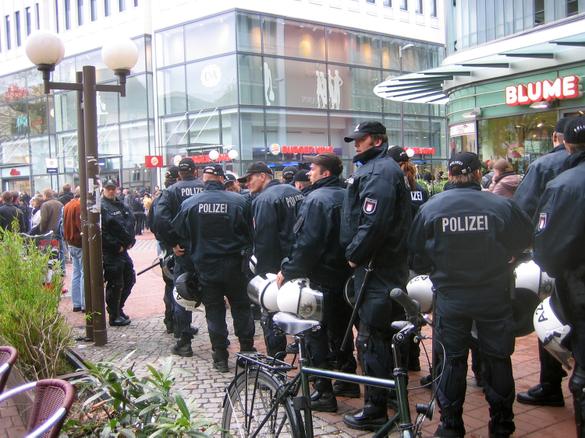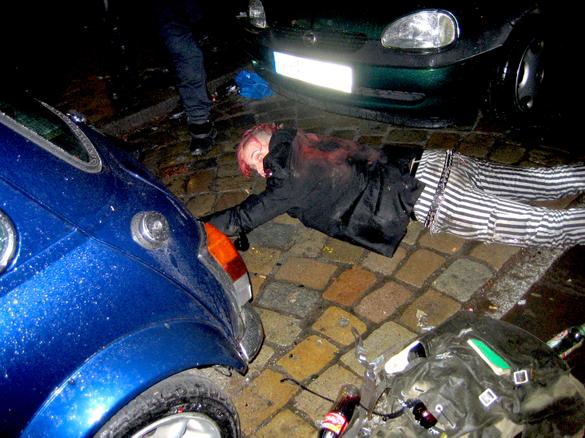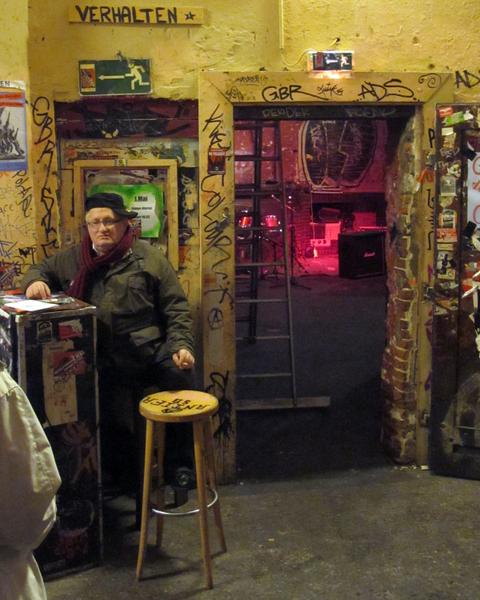I Sleep in Hitler's Room (4 page)
Read I Sleep in Hitler's Room Online
Authors: Tuvia Tenenbom

This is the Radical Left, I’m told. It would be interesting to know what the Radical Right is doing today. Buying less beer? More beer? Eating sliced-vegetable salads instead of the fruit salads? Who knows. I’ll have to check it out. I write a note to myself: Join Radical Right.
Eating done, someone barks from a very loud loudspeaker: “Erster Mai!” (May first!) And the audience barks back, stomachs full. To be honest, I’m really lost. If these people came here to demonstrate, I don’t see it. I must have been given the wrong info. This is not a demo parade, this is a party. Yes, must be.
As if to confirm my thoughts, young German men in black clothes and red flags start performing rap music. Well, kind of rap. If you come from New York and have seen the real thing in clubs, or in subway stations, you know this ain’t no rap. Just young Germans trying to be black. But it’s a party. Who cares?
Other youngsters, apparently excited by the sound, start yelling: revolution!
Is this a song as well? Who knows!

There are other players in attendance, I notice as I walk around, the only parader so far. The police. Oops. I got it wrong, obviously. This is a demonstration.
The cops are getting ready, walking around leisurely, helmets in hand. Are you expecting trouble? I ask one of them.
“I don’t hope for trouble,” he answers in English. Good.
The rap music continues. More beer is consumed. Slowly something like a parade begins to take shape, finally. I march with them. Slogans fly, about international solidarity, peace, love, revolution, anticapitalism, equality, justice, and other great words. Some have slogans taped on their clothes as well, which read the city is ours. A young man tapes another slogan on an electricity pole. What’s this about? I ask him.
“This is about,” he says proudly, “alcohol and lemonade.”
Can you say that again?
“Alcohol and lemonade. Together.”
Right. Is this why you are here, demonstrating?
“Yes.”
Could you explain?
“It should be permitted.”
Is it forbidden?
While this dialogue is going on, a fellow marcher chimes in. “It’s about police brutality,” he offers.
Not about lemonade?
“No! The lemonade part with the alcohol,” he explains, “is just a play on words. But it’s not about lemonade. Nobody here is marching about lemonade. No. No!”
So, is this about police brutality?
“Yes!”
OK. We’re getting somewhere. The lemonade guy is giving in. Brutality? Brutality! I must admit that I don’t get it. How did you get from lemonade to brutality, if you don’t mind me asking you?
“Where you from?”
Jordan. Today I am Jordanian.
This man, too, likes Jordanians, and he gets patient with me, a stupid but lovable Arab. “Police here are brutal. They don’t think for themselves. Only follow orders.”
It’s rainy and messy and I’d like to know how far we still have to go. I ask him if he knows where the parade is heading.
He doesn’t know.
So where are you going?
“Where everybody’s going.”
Follow them?
“Yes.”
Like the police, following orders?
He smiles. “Yes,” he says. “I, too.” He lights up a cigarette, drinks a bit more beer, and stares at me.
Jordanians are not that stupid after all.
We arrive at a place called Sternschanze, a place on the planet. Nothing special happens. More beer. And more beer. If you are not a capitalist, I conclude, you drink beer. Lots of it. “We are waiting for the night,” somebody finally confides in me.
The night finally arrives. The kids, who have been drinking beer like camels for hours, decide they would like to have an extra bang for their money: pleasurable use of the empty beer bottles. Why not? They paid for it. They throw the bottles. Everywhere. On cops, at stores. Anything that moves or doesn’t deserve an empty bottle. And then some stones. Or whatever. Anything that can hurt or kill. Right next to me I see a young man bleeding on the street, lying between two cars. Nobody cares. It’s a war zone. A battle. And in this battle between the young beer drinkers who want lemonade and the police who don’t, the latter seem the weaker. The police fight back with water-canon trucks but use them sporadically. Spritz and then stop. Spritz. Stop. But not only water, as they also use video cameras. This is something amazingly beautiful: The cops charge into the crowd with video cameras. Between the lemonaders and the cops, it’s the cops who are afraid to go to jail. That’s the way it works here, I guess. The cops here must document their “good behavior.”
Bottles splinter at the landing next to me. I ask the lemonaders to explain to me why they are doing this. They tell me they believe in freedom, in peace, and in love.
I hope they don’t fall in love with me. This is love with no limits. And as the night wears on, the lovers/lemonaders start using explosives. Boom! Boom! Boom!
This is the first day of my journey into Germany, but I feel totally lost. I spend hours here and I understand nothing. The only thing I figured out so far is this: I am a witness to a battle between lemonaders and video-camera carriers, where either side can potentially end up in the hospital or in the graveyard. But I don’t get it. Why can’t these two sides drink and take pix together in peace? I must be missing something here. I urgently need to find myself someone who can explain it to me. Who might that be?
I leave this Boom! Boom! Boom! techno/rap concert and go to the train station. Problem: the trains do not operate. No taxis either. I have to use my feet, like Adam and Eve. Not exactly: The streets here are littered with broken glass, this is no Garden of Eden. How did we get from a fresh fruit salad to explosives?

I get to the apartment where I live in Hamburg in one piece. It’s a student dorm, known here as WG (
Wohngemeinschaft
). Maybe I should ask them to explain to me what I’ve just seen. But before I open my mouth I take a closer look around: The place is full with empty beer bottles. Everywhere I look is beer. Must be hundreds of bottles. I probably shouldn’t waste my time discussing anything with more drinkers. How these students get to study anything is beyond my capacity to comprehend.
Upstairs on the top floor lives an old lady, a woman who can hardly walk. Young German students congregate next to her apartment, drinking, smoking, and having sex. The old lady won’t sleep tonight, the noise is simply unbearable. But the young students are having fun. Only that they don’t call themselves “fun people,” Like the Boom! rappers in Sternschanze, these students call themselves Anarchists too. And these anarchists want to change Germany. Because, as I work hard to understand, life is very hard here. There’s no Freedom, they tell me. The only way I can explain it is this: German Authorities force these youngsters to drink, smoke, and have sex. All the time.
I don’t know, I’m a tourist here.
For the next few days I ponder this question: Why am I here? Without an advanced degree in psychiatry or some other related field, I stand no chance to understand anything. Why did I take this assignment? Maybe I should see a movie, I say to myself.
A poster for a movie at a theater called Abaton shows two gay Orthodox Jews in Israel. The movie is called
Du Sollst Nicht Lieben
(Thou shalt not love). They even have an explanatory note in the window, claiming that, according to the Talmud, homosexuality doesn’t exist. I don’t know who taught them this particular item, since this is simply not true. Maybe they got confused by remarks the Iranian president, Ahmadinejad, made in a speech at Columbia University in New York the other day, where he said that there were no homosexuals in Iran.
Perhaps I’m just too literal, perhaps there is depth here that is still lost on me. Maybe the anarchists are geniuses and I simply don’t get it. German culture must be so sophisticated that it takes extra care and concentration to understand it. This also makes sense, doesn’t it? Look at Mercedes, Audi, BMW. They’re all German.
Bearing this new discovery about Germany in mind, I go back to the Sternschanze neighborhood to find some of the demonstrators and have them explain to me why they did what they did a couple of nights ago.
I meet Ole, a young man, a kid, actually, next to a very ugly place called Rote Flora.
Do you know the Rote Flora? That’s where young people with orange and blue hair jellied up in the form of knives stroll by. Know them? They are the ones who are dressed with torn leather jackets, dirty pants, piercings all over, and usually accompanied by big dogs and big bottles.
Ole is glad to share his life philosophy with me:
A. He believes in peace.
B. There should be no police to protect the state.
C. Anarchy is good.
D. Let the people decide.
Next to where we chat there’s a handmade memorial to a leftist who died in the area. “
In stiller Trauer . . . Joe
” (In loving memory . . . Joe), it says on it.
How did he die?
“I don’t know.”
What would you do, if there were no police and you caught a murderer?
“Talk to him and try to make him repent in the hope that he won’t do it again.”
And if someone rapes a woman, what should be done with him?
“Same thing. The idea is that the people should decide, not the police.”
Do you have a girlfriend?
“No.”
Did you have one before?
“Yes.”
Did you love her?
“Yes. Very much.”
If I raped her, what would you have done to me?
“Kill you!”
Wait a second! Didn’t you just say—
“But that’s my girlfriend. It’s different!”
Do you think you make sense?
“I have to go. I’m sorry. I don’t have time.”
I must figure these people out!
I venture inside the Rote Flora. Like its exterior, the walls inside the Rote Flora are covered with graffiti:
No heißt nein
[No means no]No border, no nation
Erst geschossen nie gedacht
. . . (Shoot first, think later . . .)

They must be fighting for something, only I’m not sure what it is or whether in fact they’re fighting not for it but against it. This place looks like a stable, actually. I’m not saying that in a bad way; stables can be good. The graffiti is the only evidence that this place is inhabited by people, not horses. The people, all youngsters, are moving in and about the various graffiti-filled rooms, looking busy. The most common activity here is beer drinking and smoking. So I get a beer, light up, become like them, and start talking to them. A young man tells me how Those Nazis got him the other day, beat the hell out of him, and how he almost, just almost, had to bid life goodbye. It’s a miracle that he survived. They are dangerous, the Nazis, he tells me, and they lurk everywhere in this land.
That’s what we are doing here. Fighting the damn Nazis.
There is a reason to life, I guess, beyond just fighting the police: Fighting the Nazis.
This weekend, Rote Flora and other institutions of the radical left in the area will celebrate the defeat of the Nazis. My luck, I came at a good time. The fight goes on: one day the police, another day the Nazis, and in between a few beers. It takes me about an hour to feel at home in the Rote Flora. The box office—yes, they have one—sits empty. Good place to be. I go there, sit on the dirty chair, and get ready to sell tickets. Youngsters come to me and ask what’s the plan. God, if I only knew! I check the pile of postcards to get familiar. I should know, shouldn’t I? I am the Box Office Manager, after all. Oh, here’s something interesting, a postcard that reads:
hitler kaputt!
What is this? Oh, yeah, a concert at the Rote Flora.